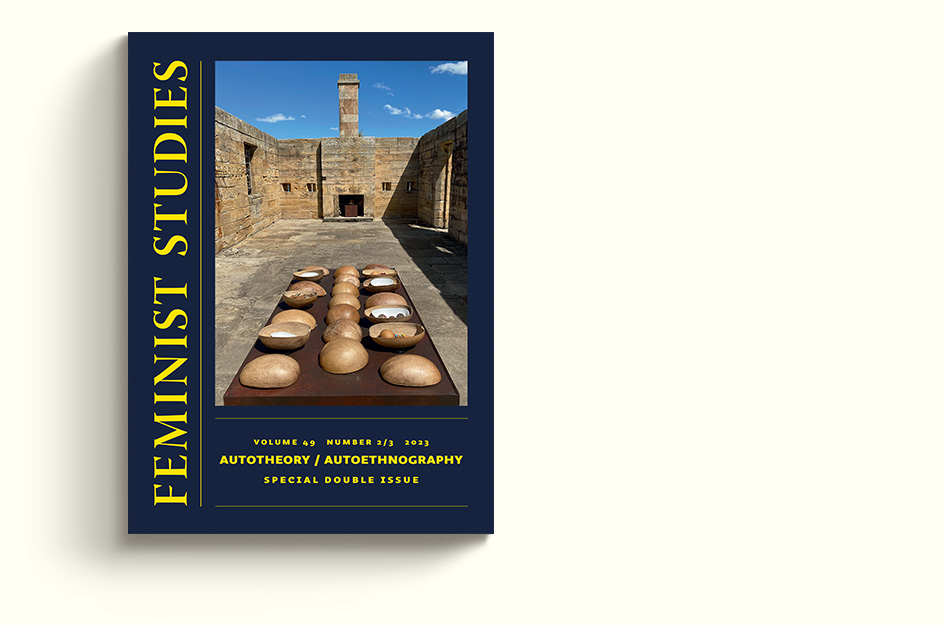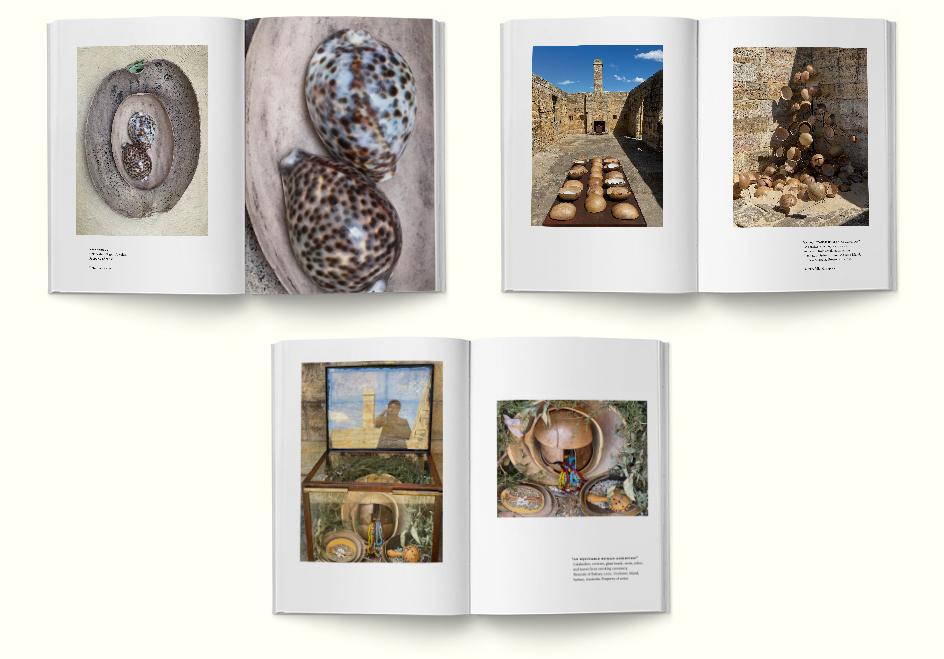Current issue


“The history of feminism is, in a sense, a history of autotheory,” writes Lauren Fournier in her 2021 book, Autotheory as Feminist Practice in Art, Writing, and Criticism. This special issue of Feminist Studies features essays, artworks, and an interview that contribute to these intertwined histories by enacting autotheory and/or reflecting on the development of the field. The volume opens with two essays that explore embodied possibilities for living in a world saturated with violence. Cynthia Belmont reflects on deer hunting as an ecofeminist practice, arguing that vegans and subsistence hunters might find common ground in grappling with the complexities and complicities of our relationships to the land and creatures that enable us to live. Megan Sweeney creates a dialogue among three contemporary autotheorists—Christina Sharpe, Arianne Zwartjes, and Melissa Febos—who draw upon their embodied experiences in reckoning with pervasive forms of racialized, nationalized, and gendered violence.
The next five pieces in this special issue center marginalized bodies and care work. Focusing on a difficult period when she was navigating a health crisis and conducting research about murders of Black women, Terrion L. Williamson discusses how reading the work of Audre Lorde renewed her affective relationship to Black feminism, reminding her that it is not just “a theory to be applied” but “a framework for a way of being.” Devaleena Das recounts her devastating experiences as an immigrant mother of color who witnessed the death of her newborn infant. Das’s autotheory illuminates how racist and sexist dimensions of the healthcare system fundamentally shape the biopolitics of visibility, protection, and care. Marshall Azad McCollum, a Bangladeshi-American, reflects on the devaluation of domestic care labor in capitalist societies; while living with his ailing grandmother in Bangladesh, McCollum witnessed how the crisis of care jeopardized the health of both his grandmother and her live-in caretaker. Na Mee’s creative nonfiction explores care work from the dual perspective of a mother whose son is a puzzle she will “never solve” and a grieving daughter who cannot save her dying father in real life or in her dreams. Finally, in dialogue with anthropologist Lyndon K. Gill, Black feminist ethnographer Gina Athena Ulysse interprets a collection of Haitian Kwi (calabash bowls) and Bwapin (fabric-wrapped pine kindling) as a Rasanblaj, a feminist “regrouping against the scattering” that enables viewers to identify and sit with the wounds of slavery.
The next four pieces in this special issue highlight questions of method in engaging with and enacting autotheory. In her interview with Megan Sweeney, Arianne Zwartjes discusses the relationships among autotheory, autopolitics, and creative nonfiction, and she offers suggestions for helping students to navigate the ethical complexities of reading and writing autotheory. Conceptualizing autotheory as a “trans method,” Eamon Schlotterback examines how trans scholars use autotheoretical techniques to craft their sense of self, create alternative modes of community, and produce counterhegemonic forms of knowledge. Olivia Ordoñez analyzes Taylor Swift as an “autotheoretical songwriter” who explicitly foregrounds her ongoing process of self-construction through her songwriting, segmentation of her career into distinct eras, and re-recordings of her first studio albums. Kristen E. Nelson adopts autotheory as a method for exploring broader histories through the lens of a single story; by attempting to understand the life of a single woman burned as a witch, she attempts to fathom the loss of the countless women murdered as witches in Early Modern Europe.
This special issue concludes with two essays that foreground collaborative methods of generating autotheory. Six long-term friends from different countries—Azza Basarudin, Tina Beyene, Elora Halim Chowdhury, Sharmila Lodhia, Catherine Z. Sameh, and Khanum Shaikh—illustrate the varied ways that stories about preparing and consuming food serve as crucial sites for analyzing home and nation as spaces of attachment. Israeli feminists Amal Ziv and Maya Lavie-Ajayi collaboratively interrogate their own sexual histories in relation to contemporary feminist debates, conceptualizing sexual agency “as a context-dependent and relational experience” that can coexist with “internalized oppressive discourses.”
[CONTINUE...]
- Contributors
- Cynthia Belmont
- Megan Sweeney
- Terrion L. Williamson
- Devaleena Das
- Marshall Azad McCollum
- Na Mee
- Lyndon K. Gill and Gina Athena Ulysse
- Arianne Zwartjes
- Eamon Schlotterback
- Olivia Ordoñez
- Kristen E. Nelson
- Azza Basarudin, Tina Beyene, Elora Halim Chowdhury, Sharmila Lodhia, Catherine Z. Sameh, and Khanum Shaikh
- Amal Ziv and Maya Lavie-Ajayi
- Stephanie Spector, Samantha Auerbach, Julie Laut, Lara Caroline Islinger, and Emaline Marie Reyes
- Loubna Qutami, Inderpal Grewal, Caren Kaplan, Sherene H. Razack, Evelyn Alsultany, Minoo Moallem, Elora Shehabuddin, and Nadine Naber
- Featuring art by Gina Athena Ulysse
Previous issue


At a time when we see in the United States and elsewhere the rise of a virulent right wing, with its outspoken defense of white supremacy and explicit criminalization of transgender and gay people along with the criminalization of abortion, this Feminist Studies issue focuses on histories of US racial formations, gender/sexual embodiment, transgender and cripqueer activism, and exile. The review essay by Candice Lyons describes new approaches to the history of nineteenth-century racial formations. Joy Ellison, Jess Waggoner, Jessica Lee Mathiason, Adam Ostolski, and Sonja Mackenzie center gender/sexual embodiment and nonnormative people’s experience by exploring, respectively, transgender radical activism in the face of police violence targeting mainly Black transgender individuals in the Midwest, the cripqueer challenges to the exclusions of disabled people from the lesbian community, the corporate construction of reproductive risk, the right-wing invocation in Poland of resonant anti-Semitic tropes to demonize gay people, and a creative autoethnography about the challenges faced by queer parents raising children in homophobic societies. The art essay by Eva HD elicits another notion of “trans” in examining Iranian photographer Gohar Dashti’s images evoking migration, exile, and the transhuman life of plants.
[CONTINUE...]
- Contributors
- Candice Lyons
- Joy Ellison
- Jess Waggoner
- Eva HD
- Jessica Lee Mathiason
- Adam Ostolski
- Sonja Mackenzie
- Featuring art by Gohar Dashti
|
Social Media
Find us on Facebook.
Follow us on Twitter.